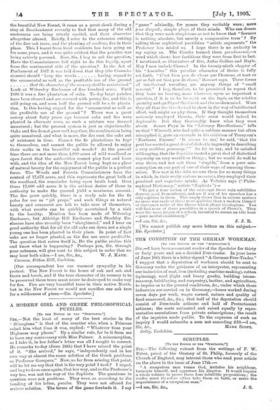PUZZLES.
[To MI EDITOR OF THE "SPECTATOR:]
Sra,—Not the least of many of the best stories in the " Menagiana " is that of the courtier who, when a Princess asked him what time it was, replied: "Whatever time your Highness may please." By a similar rule, far be it from me to have any controversy with Miss Palmer. A misconception, as I take it, in her father's letter was all I sought to correct. He remarks to-day (June 24th) that I have missed the point of it. "She arrived," he says, "independently and in her own way at almost the same solution of the Greek problems as Professor Gomperz." Now, so far from missing that point, will he let me say that that is the very point I took ? I urged, and beg to do so once again, that her way, and so the Professor's way too, was not the way of the Sophists. The questions in question were not problems. They were, as according to the beading of his letter, puzzles. They were not offered for serious solution. The terms of the game forebade it. I say " game " advisedly, for games they veritably were; mere jeux d'esprit ; simple plays of their minds. Who can dream that they were such simpletons as not to know that "fewness is nothing absolute, but merely a comparative term" P By calling these sophistical puerilities "subtle arguments" the Professor has misled us. I hope there is no audacity in my saying so. The Greeks termed them pseudomenoi,7-a word which shows how factitious they were from first to last. I mentioned, as illustrative of this, Aulus Gellius and Bayle.
May I now include Cicero? In the twenty-ninth chapter of his " Lucullus " this peculiar character of theirs is fully set forth. " C'est bien pen de chose Tie rhomme, et tout ce qui se fait eat hien peu de chose," Bossuet says. These forms of intellectual wrestling are anyway things of " small account." I beg. therefore, to be permitted to repeat that they have no bearing, none whatever, upon so important a question, if it is to be brought on the tapis, as the relative quantity and quality of the G reek and the modern mind. Were they all that the G reeks had to show in the way of intellectual effort, well might we pity them. If they thought themselves seriou.sly employed therein, their error would indeed be deplorable. But they thoroughly knew what they were about. James Payn in his "Literary Recollections" tells us that " Whewell, who had quite a sublime manner but often misapplied it, gave an example in his criticism of Tennyson's Northern Farmer." It seems to me,' he said, that the poet has wasted a great deal of dialectic ingenuity in describing a very wathless pussonage! " So let us say, and be satisfied with saying, that the Sophists wasted a great deal of dialectical ingenuity on very worthless things ; but we would do well to stop there, and not call them " stapids," from a pure mis- conception on our part of one of their ways of amusing them- selves. Too vast is the debt we owe them for so many things in which, in their really serious moments, they employed their practical and sagacious minds. As Voltaire says (" Philo- sophical Dictionary," article "Sophists ")- "To get a true notion of the contempt these vain subtilities deserve, read Demosthenes, and see if any of his speeches has a silly sophism in them. I his amply shows that in serious matters no more was made of these mere quibbles than a modern Council of statesmen make of the theses which please theologians. You will find none of thesa puerilities in a speech of Cicero's. They were the mere jargon of a school, invented to amuse an idle hour —pure mental charlatanry."
—I am, Sir, &c., J. J. R.










































 Previous page
Previous page